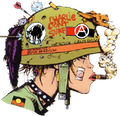I’ve read the Communist Manifesto and found myself agreeing with the ideas presented. However, I’m left wondering: what’s the real point of studying Marxism-Leninism more deeply? It feels like the principles are clear, and it’s unlikely that a deeper understanding of them will lead to significant change.
It seems to me that content creators, like those from podcasts like Deprogram, have a more direct influence on people’s perspectives today. So, I’m curious, why should we invest time in studying these ideologies when there are more immediate ways to engage with and affect the world? What benefits can understanding Marxism-Leninism actually provide in today’s context?
Ultimately, the purpose of studying theory is in informing practice. Studying to become a capable revolutionary is like studying to become any professional worker, practice and theory sharpen and inform each other. Theory gets tested in real life by real practice, and is affirmed or denied, then this new theory is advanced and carries onward. The lessons past revolutionaries have taught us from their successes and failures make us more effective.
As an example, in Marxism-Leninism, we find coherent analysis of imperialism. Without properly understanding how imperialism functions, we are blind to why the US Empire is declining while countries like the PRC are rising. When we understand how imperialism functions, we learn how we can kill it. Party structure is another good example, as well as dialectical materialism as a methodology for achieving positive change.
Correct analysis is the basis of correct revolutionary tactics.
As comrade @StillNoLeftLeft@hexbear.net already posted, I made an introductory Marxist-Leninist reading list if you want to dip your toes into theory! The manifesto is a good read, but doesn’t really go in-depth anywhere.
There is no revolutionary practice without revolutionary theory
Why reading college science books and science papers if you can just watch Veritasium and QuantumFracture?
For the average person though, pop science is enough. Reading real science literature won’t benefit my life in any material way.
Does socialist theory help me as an average prole? Maybe not? I’ll keep reading anyways because I like it but I’m not certain how valuable it is beyond that.
When spreading the word /discussing things it’s better to be able to articulate ideas oneself instead of telling people to listen to a podcast.
Sure, you can take them as a sort of audio books, I guess, but when I try to articulate knowledge that I know cuz I first absorbed it from podcasts I suck at it
Why do you think the black panthers had a reading list? Reading theory doesn’t make you a better proletarian under capitalism, it does make you better prepared to spread the word of socialism and anti imperialism

Theory helps you as a revolutionary, just like reading mechanical textbooks helps mechanical engineers. Not everyone needs that level of understanding unless they are actively applying it, but for those that are, they absolutely need to study.
Pop science is also full of bullshit though. If you don’t have at least some solid grounding in the scientific method and science basics, you won’t be able to tell if the pop science you read is bullshit or real.
Similarly, and even worse because of the sheer quantity of intentional misdirection in the political realm, if you don’t have some baseline grounding in theory, a working understanding of historical materialism perhaps, then you will not have the mental tools to evaluate the pop politics and decide if they are right or full of shit. It isn’t something that’s common sense or easily reasoned from first principles
As communists, we should aspire to go beyond just trusting prominent figures, whether they’re influencers, politicians, publications, whatever, and improve our faculties and awareness and understanding of the world
Idk, half the time I read a pop science article and look for the underlying studies they say the opposite.
“yeah, I agree with the class stuff, they have us arguing about cultural issues instead of uniting”
“What I imagine is some kind of worker owned business that’s going to outcompete the old way of doing business”
“I give them bonus points for not being capitalists, but these authoritarians do not have people’s best interests at heart”
If you don’t know what you’re talking about and you have a disorganized, unfocused base then you’re going to have a very silly, inaccurate movement laden with the same problems as ever. You’d need to be theory disciplined if you want to be effectual. The same way you can draw something okay from imagination but you need to learn form, perspective, and anatomy if you want to progress to a certain level of competency
0.000% of Communism has been built. Evil child-murdering billionaires still rule the world with a shit-eating grin. All he has managed to do is make himself sad. He is starting to suspect Kras Mazov fucked him over personally with his socio-economic theory. It has, however, made him into a very, very smart boy with something like a university degree in Truth. Instead of building Communism, he now builds a precise model of this grotesque, duplicitous world.
Where do you think places like the Deprogram are cribbing their ideas, and why do you have an inherent trust that a bunch of podcasting yucks (though good for podcasting yucks) will present those ideas well and correctly?

deleted by creator
The marxist-leninist revolutions succeeded while the other branches of marxism almost all failed. Deeper understanding is required to replicate success instead of failure.
For me it’s most about my own understanding and agency and building those. If we just follow others framings of a thing we risk falling for things like idealism, utopistic framings etc. Reading theory ourselves (with a broad scope) gives us the actual nuance of what has happened in history, what is happening now and most importantly how we can change things.
Things like dialectic materialism, idealism versus materialism, what the troskyists are about, what anarchist are saying and why the Soviets did what they did and so much more is an evolving understanding. It takes a lifetime, but it does make a commie more and more bulletproof to various brainworms of which there are plenty.
It takes reading theory to come to a place where you can spot the difference between different thinkers or content creators. It takes time to develop this understanding. I don’t think the manifesto alone is enough for that. It’s also just as important to read the lib thinkers a bit to understand the histories of these things. Reading on feminism, anti-colonialist, anti-imperialist and anti-racist works is also just as important.
Understanding the differences of idealism and materialism alone makes everything a lot more clear, but to get there, some learning is needed. We are all (in the West at least) indoctrinated on liberalism so deeply that is is very difficult to see past that. Things that come along with it are white supremacy, pathriarchy and others that are parts of the superstructure and hard to analyze as they are so normalized. To do this analysis an understanding of it is necessary imo.
Edit. I’ll add a great reading list that was made by comrade @Cowbee@hexbear.net, in case you would want something curated that isn’t too time consuming and covers a lot of the things I tried to mention in my reply.
The reading list is here.
Thanks for the shoutout, comrade! And great comment!
it gives you a clear and structured way of how to explain these things to other people. also it can fill in gaps in knowledge, some concepts may be obvious to you but others may not be
what’s the real point of studying Marxism-Leninism more deeply
i am new on the journey, but there is something that fidel and che would say about these things
in that stain of thought of marxism as a science
but basically reading deeply help build your knowledge on the subject, give you the insight of all those that came before you, you create within yourself a long familial linage of knowledge which connects you to the past. also when a person ask you question, and you answer “i don’t know”, it kind of make the person internally think “why am i listening to this person?”
like with mathematics, the more you study and practice - the more effectively you can apply to the different problems you will inccur.
edit. i think it was some roman/greek philosopher that said something like, reading/study firmly establishes you into one of the “great houses”, the extensive study of marxist leninism - make you a family member of this house, their predecessors live on in their students and continue to be developed by the students in this house. (though this may seem to come into a slight conflict with the science analogy, this is not a dogma, it is the application of a science)
I found a YouTube link in your comment. Here are links to the same video on alternative frontends that protect your privacy:
It’s pretty important to read what revolutionary leaders have written about their strategies and their methods of organizing because some of them succeeded, while we haven’t (except the 2 Chinese posters on this site I guess, but I don’t think they were around in 1949). You can learn about the problems they identified with the organizations they had: opportunism, infiltration, dogmatism, tailism, liberalism, ultraleftism, etc. If you join an org today you’ll see all the same things, it’s pretty much a 100% guarantee. So figuring out how to navigate those things productively and build power, instead of just constantly hoping for your enemies to make mistakes and for people to spontaneously organize into socialism, is your best shot at building something positive.
A lot of theory has to do with broad questions of history and political economy that might not seem to be as practically minded as texts such as On Guerilla Warfare or What is to be Done, but those pieces of theory are also important for informing a revolutionary movement’s overall strategy and figuring out how to define a correct political line. Generally, it’s a good idea to decide on a solid foundation of how a movement sees its place in history and what its goals are; if you avoid backtracking from those goals for the sake of gaining more popularity (i.e. opportunism) and remain steadfast in that correct political line, your organization will be solid and will outlast others, so the masses will join you. That’s been the pattern with the most successful ML revolutionary organizations. Not to mention that fully understanding the nature of the system you’re trying to overthrow is helpful for various reasons; you don’t want to end up reinforcing the system by failing to understand some of its characteristics (e.g. anti-identitarian socialists who reject anti-racism who, if they were successful, would end up reinforcing class society across racial lines) or fail to identify cracks in its armor (e.g. understanding the mechanisms behind the boom and bust cycle allows a revolutionary labor movement to strike when it will hurt capitalists the most).
I’m going to say there is a difference between “learning ML theory” and “reading the source ML material” though. When I’ve tried to read the source material, I have a hard time sifting through the … potentially… irrelevant stuff to get to the actual concepts. Marx’s shorter works are okay and don’t get me lost in difficult to parse grammar/paragraph structure but Das Kapital is physically hard to read for me. I do wonder how much of it is that Marx didn’t write in English and it was others who handled the translations, maybe they wanted to keep more of Marx’s personality in the works and chose to use a very light hand when editing?
The few works of Lenin that I’ve read, spend so much time mentioning (but not explaining) People, Places, Pamphlets, Articles that I lose track of whatever point he was trying to make. It very much feels like Lenin was not specifically writing for future readers.
The few items of Mao I’ve read, on the other hand, feel like they were written for future readers. Less name dropping with the assumption that you will just know who these people are and why they were important and more focused on encapsulating the concepts in the work you are currently reading.
So I’m kinda stuck trying to find explainers for things or skimming through the book club posts’ comment sections. Which, while not great, is something.
Learning the concepts and history is important to keep from making mistakes that were solved in the past and being able to identify patterns of events to correctly anticipate outcomes.
An example we can look at: Right Libertarians when they do absolutely anything.
In every case where a recent right libertarian started a project, it winds up having to “reinvent” all the things they advocate against. 100% free speech zone online? “Oh shit, we’ve gotta start moderating/censoring content when things get posted that cause problems!” 100% freedom to do whatever you want on a large boat/city floating in international waters? “Oh shit, before you get settled in, you can’t use all the potable water or set fires everywhere!”
The point is to make oneself miserable.
lol. Seriously though, Manifesto was written in 1848, State and Revolution was written in 1917, Quotations from Chairman Mao was written in the 1960s, Women Race and Class in 1981, and in between and since hundreds of other books have been published in related subjects.
Like learning about an application of the scientific method, the study of Marxist literature is about learning about the application of historical materialism in the analysis and planning of society, dedicated to development of an international body committed to revolutionary socialism tea and the overthrow of capitalism worldwide.
The purpose of the study is to be able to identify how the systems work, how they can be changed, and ultimately “what must be done.” The broadness of the topic is by design as it can applied to many fields from public health to ecology to military in understanding how the international proletariat is affected, and how we can build systems of solidarity with all comrades.
There are also varieties of experiences catalogued through a Marxist lens: Black, Indigenous, immigrant, survivors of war, survivors of natural disasters, victims of state oppression, feminist, trans, etc which allow one to expand their world view to better support one’s comrades, and to understand the unique considerations which go into that support.
For me, the culmination of this is not the Communist Manifesto, but more modern writing like Pedagogy of the Oppressed; which builds from and references to historical writing (in a way that excellently guides additional study) in describing the necessity of engaging with the international proletariat in the act of understanding the world as it is, and building a more humane future
Oh and “Venceremos!” - a collection of Che Guevara’s writing is another more modern exposition on the topic- which you may find more relatable. I’d also encourage looking up things like the ecosocialist manifesto which is another more modern application.
Reading fundamental texts is just one way of learning the fundamentals of marxism/dialectical materialism - but is comfier than laboring oneself. And if one has experience with the capitalist fundamentals (in the biblical sense) - it helps understand the hierarchical systems which have exploited you- and prevent misdirected anger (I.e towards other exploited peoples).
Most important though is that this activity - as most things - is best done in the presence/collaboration with others if possible. Since no one’s word is rote- Marx would agree - a community of people can only change their community as they experience the world together and move it towards a more humanitarian future.
So however one best learns, and therefore is able to teach/learn/engage with their community, is by definition the “best method”.
And in doing so - you’ll help potentially make your community less miserable- and definitely more miserable in the interim :P
Oh and one more thing - if you like to think of things in a more scientific lens - I always recommend HT Odums Environment, Power, and Society https://archive.org/details/environmentpower00odum which is largely about how energy cycles through the ecosystem in a very literal sense using systems analysis. Then it ends up as (IMO) an excellent application of scientific materialism to understand societal development through the lens of control over power (literally - fossil fuels, etc), and the formation of hierarchies based on most direct access to and ability to distribute/own that power (e.g. the means of production). So like I said, there are lots of adaptations over time and lenses through which to consider dialectical materialism, so literally hit up whatever you can. You can even go talk to an anarchist irl if you’re feeling real wild
 they’re usually very nice
they’re usually very nice














